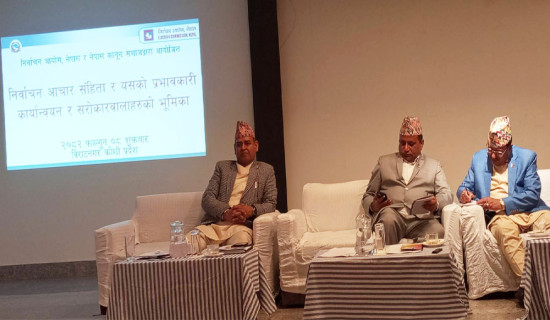- Friday, 20 February 2026
Deepening Nepal-China Ties
Nepal and China are celebrating the 70th anniversary of the establishment of diplomatic relations throughout this year. To initiate the celebrations, the other day, Heads of State from the two nations exchanged congratulatory messages, highlighting shared values, deepening friendship, and enhanced cooperation. The two nations decided to set up their formal diplomatic ties on August 1, 1955. This was a significant event in the diplomatic history of Nepal, as this boosted its independence and confidence in conducting international relations. The bilateral ties were formalised in the aftermath of the establishment of multiparty democracy in Nepal and the accomplishment of the New Democratic Revolution in China.
Nepal was opening up to the outer world and its relationship with China provided more space in the global diplomacy, while the latter found a reliable friend in Nepal, which had played an important role in securing membership of the United Nations. Nepal has firmly adhered to the One-China Principle, while China has consistently respected Nepal’s sovereignty, territorial integrity, and political independence. Nepal-China relations are based on Panchasheel, the Five Principles of Peaceful Coexistence, which stresses mutual respect for each other's territorial integrity and sovereignty, non-aggression, non-interference in internal affairs, equality and cooperation for mutual benefits, and peaceful coexistence. In the last 70 years, the two countries have inked scores of agreements which have guided, shaped and consolidated their bilateral bond.
The bilateral agreements include China-Nepal Boundary Agreement (1960), Treaty of Peace and Friendship (1960), Trade and Transit Agreement (2016), Memorandum of Understanding on Cooperation under the Belt and Road Initiative (2017) and Framework for Belt and Road Cooperation (2024), which have focused on trade, connectivity, investment, infrastructure, energy and people-to-people relations. During Chinese President Xi Jinping’s visit to Nepal in 2019, their relationship was elevated to a strategic partnership of cooperation featuring everlasting friendship for development and prosperity.
On the occasion of the 70th anniversary of the diplomatic ties, President Ram Chandra Paudel sent a congratulatory message to his Chinese counterpart, Xi Jinping and said that the two countries’ friendship withstood the test of time as they had consistently upheld mutual trust, sovereign equality and peaceful coexistence. Similarly, President Xi noted that the two countries had always respected each other, treated each other as equals, and engaged in mutually beneficial cooperation, setting a model for friendly relations between them with different social systems and of different sizes. Over the decades, Nepal-China ties have grown stronger and become more intimate, stable and amicable. High-level political visits, understanding and respecting each other's geopolitical sensitivity, have marked these ties. Both neighbours have supported each other in the difficult times.
Addressing a reception organised by the Chinese Embassy in the capital to mark the Platinum Jubilee of the ties, Prime Minister KP Sharma Oli said that Nepal-China relations have civilisational roots and cultural closeness. The signing of the Belt and Road Cooperation Framework reflected a shared resolve to enhance connectivity and partnership, he said, adding that China’s support in infrastructure and connectivity has played a vital role in helping Nepal overcome its geographic constraints. Nepal-China relations now encompass the areas of agriculture, trade, transit, energy, tourism, education, sports, health, digital technology, and climate resilience. Given the growing threat of climate change, Nepal and China should work together to conserve the Himalayas that straddle both nations. As Nepal-China relations grow stronger, this will prove more fruitful in bringing deeper mutual respect and shared prosperity in the years to come.




-square-thumb.jpg)



-square-thumb.jpg)








